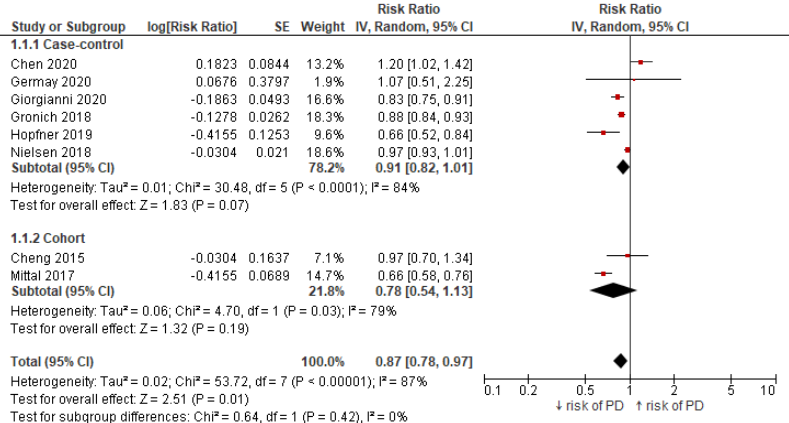Objective: We performed a systematic review and meta-analysis of real-world evidence (RWE) studies evaluating the association between use of beta-agonist and the risk of PD.
Background: Parkinson’s disease (PD) is exhibited by intracellular accumulation of Lewy Bodies (α-synuclein) encoded by α-synuclein gene. A possible relationship between beta-adrenergics and α-synuclein synthesis has been shown. RWE studies evaluating beta-agonist use and risk of PD have reported conflicting findings.
Method: PubMed and Embase were searched from inception to October 2020 using Ovid. Two reviewers screened records in duplicate and RWE studies reporting the relative risk (RR) estimates of PD in beta-agonist users, compared to non-users, were included. Newcastle-Ottawa scales (NOS) was used to assess the study quality. We employed the generic inverse variance method using RevMan (5.3.5) to estimate pooled adjusted RR (aRR) using a random-effects model. Sub-groups were analyzed based on study design and type of beta-agonist used.
Results: Of 952 records, nine studies (6 case-control; 3 cohort) with 6206654 participants, including 71278 PD cases, were included; five studies reported a decreased risk, while four studies found no significant association. In the overall pooled analysis (studies, n=8) including any beta-agonist users, compared with non-users, the aRR for PD was 0.87 (95%CI:0.78,0.97;P= 0.01). A significant heterogeneity (I2>87%) was observed, and the majority (n=8) of the studies were of moderate to high quality, based on NOS. The risk of PD was non-significant for cohort studies (n= 2) (0.78; 95%CI: 0.54-1.13, p=0.19), and case-control studies (n= 6) (aRR: 0.91, 95%CI: 0.82,1.01, p=0.07) sub-groups. By beta-agonist type, risk of PD was significantly lower for salbutamol (n=4, aRR: 0.95; 95%CI: 0.92,0.99), terbutaline (n=2, aRR: 0.84; 95%CI:0.71,0.99), and formoterol (n=2, aRR: 0.82; 95% CI:0.73,0.93) users.
Conclusion: In the overall analysis, including any beta-agonist use, a reduced risk of PD was observed compared to beta-agonist non-users. However, the reduced risk of PD in beta-agonists users may be a result of indirect association caused by nicotine exposure. Future studies are recommended to address the concern of indirect bias using the appropriate epidemiological methods.
To cite this abstract in AMA style:
A. Singh, S. Hussain, B. Antony. Beta-agonists and risk of Parkinson’s disease: Meta-analysis of real-world evidence studies [abstract]. Mov Disord. 2022; 37 (suppl 2). https://www.mdsabstracts.org/abstract/beta-agonists-and-risk-of-parkinsons-disease-meta-analysis-of-real-world-evidence-studies/. Accessed July 5, 2025.« Back to 2022 International Congress
MDS Abstracts - https://www.mdsabstracts.org/abstract/beta-agonists-and-risk-of-parkinsons-disease-meta-analysis-of-real-world-evidence-studies/

